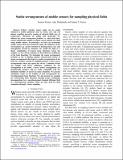| dc.contributor.author | Deshpande, Ajay A. | |
| dc.contributor.author | Sarma, Sanjay Emani | |
| dc.contributor.author | Kumar, Sumeet, Ph. D. Massachusetts Institute of Technology | |
| dc.date.accessioned | 2014-06-06T14:06:50Z | |
| dc.date.available | 2014-06-06T14:06:50Z | |
| dc.date.issued | 2012-06 | |
| dc.date.submitted | 2011-09 | |
| dc.identifier.isbn | 978-1-4673-2102-0 | |
| dc.identifier.issn | 978-1-4577-1095-7 | |
| dc.identifier.issn | 0743-1619 | |
| dc.identifier.other | INSPEC Accession Number: 13036644 | |
| dc.identifier.uri | http://hdl.handle.net/1721.1/87672 | |
| dc.description.abstract | Today's wireless sensor nodes can be easily attached to mobile platforms such as robots, cars and cell phones enabling pervasive sensing of physical fields (say of temperature, vibrations, air quality and chemicals). We address the sensor arrangement problem, i.e. when and where sensors should take samples to obtain a good estimate of a field using mobile sensors. In particular, we focus on incidentally mobile sensors that move passively under the influence of the environment (e.g. sensors attached to floating buoys, cars and smartphones carried by humans). We model the field as a linear combination of known basis functions. Given the samples, we use a linear estimator to find unknown coefficients of the basis functions. We formulate the sensor arrangement problem as one of finding suitably characterized classes of sensor arrangements that lead to a stable reconstruction of the field. We consider a family of multidimensional δ-dense sensor arrangements, where any square disc of size δ contains at least one sample, and derive sufficiency conditions for the arrangement to be stable. δ-dense sensor arrangements are geometrically intuitive and are easily compatible with the incidental mobility of sensors in many situations. We present simulation results on the stability of such arrangements for two-dimensional basis functions. We also present an example for constructing basis functions through proper orthogonal decompositions for a one-dimensional chemical diffusion field in a heterogeneous medium, which are later used for field estimation through δ-dense sampling. | en_US |
| dc.language.iso | en_US | |
| dc.publisher | American Automatic Control Council/IEEE | en_US |
| dc.relation.isversionof | http://ieeexplore.ieee.org/xpls/abs_all.jsp?arnumber=6315677&tag=1 | en_US |
| dc.rights | Creative Commons Attribution-Noncommercial-Share Alike | en_US |
| dc.rights.uri | http://creativecommons.org/licenses/by-nc-sa/4.0/ | en_US |
| dc.source | Prof. Sarma via Angie Locknar | en_US |
| dc.title | Stable arrangements of mobile sensors for sampling physical fields | en_US |
| dc.type | Article | en_US |
| dc.identifier.citation | Kumar, Sumeet, Ajay Deshpande and Sanjay E. Sarma. "Stable arrangements of mobile sensors for sampling physical fields ." American Control Conference (ACC 2012), 27-29 June 2012, Montreal, QC, p.324-331. | en_US |
| dc.contributor.department | Massachusetts Institute of Technology. Department of Mechanical Engineering | en_US |
| dc.contributor.department | Massachusetts Institute of Technology. Laboratory for Manufacturing and Productivity | en_US |
| dc.contributor.approver | Sarma, Sanjay Emani | en_US |
| dc.contributor.mitauthor | Kumar, Sumeet | en_US |
| dc.contributor.mitauthor | Deshpande, Ajay A. | en_US |
| dc.contributor.mitauthor | Sarma, Sanjay Emani | en_US |
| dc.relation.journal | Proceedings of the 2012 American Control Conference | en_US |
| dc.eprint.version | Author's final manuscript | en_US |
| dc.type.uri | http://purl.org/eprint/type/ConferencePaper | en_US |
| eprint.status | http://purl.org/eprint/status/NonPeerReviewed | en_US |
| dc.identifier.orcid | https://orcid.org/0000-0003-2812-039X | |
| dspace.mitauthor.error | true | |
| mit.license | OPEN_ACCESS_POLICY | en_US |
| mit.metadata.status | Complete | |
